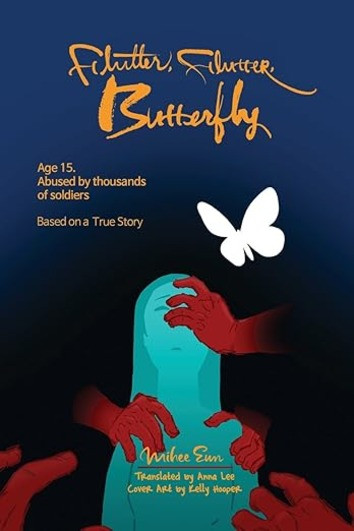
Flutter, Flutter Butterfly
Mi-hee Eun
Translated by Anna Lee
2021
Flutter, Flutter Butterfly is a historical novel based on real-life accounts of Korean comfort women. Through the perspective of Soonbun, a fifteen-year-old girl, the book traces how young girls were taken far from their homes and placed in dire circumstances under Japanese military occupation during World War II. The novel depicts her journey, from the moment she is deceived and taken away, to life in the military station, and finally to the war’s end. Eun Mi-hee presents the events with restraint but clarity, aiming to preserve the truth of survivors’ experiences while using the form of fiction to deepen empathy. The book stands as both a narrative and a respectful documentation of voices too often silenced.
The novel is based on real testimonies from survivors and avoids dramatization in favor of honest, respectful storytelling. Eun Mi-hee uses fiction as a way to preserve memory, ensuring that the voices of the past are not forgotten. Central themes include loss of innocence, historical silence, survival, and the need to confront difficult truths with compassion. Ultimately, the novel stands as both a literary work and a gentle call for remembrance, offering readers a human-centered view of a painful chapter in history without sensationalizing it.
About the Author:
Eun Mi-hee is a South Korean novelist, journalist, and lecturer whose storytelling is deeply shaped by personal history and social conscience. Born in Mokpo and raised in Gwangju, she began her career as a radio actress and journalist before turning to fiction in her thirties. Her literary breakthrough came with award-winning short stories like What Kind of Silkworm's Dream in Cocoon and Bird Fly Again, and she later gained recognition for novels that center on marginalized lives, including war survivors, the poor, and wandering performers. Her writing often addresses silenced histories and social taboos, including the legacy of the Gwangju Uprising and the trauma of comfort women. Known for her principled stance on the role of writers, Eun has consistently advocated for literature as a medium of truth, healing, and human dignity.
